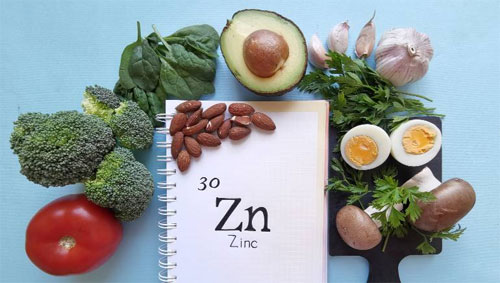Zinc and the immune system: learn how it works
When Thomas B., a technical director from Sherwood, Arkansas, started looking at all the benefits of taking the essential mineral zinc, he was amazed. “I started reading about zinc and knew I had to start using it,” he says. “I remember thinking: How could I be missing something this important?”

Thomas takes zinc as soon as he thinks he might be coming down with a cough or cold. The key is to take zinc within 24 hours of developing symptoms because that’s when it’s most effective.
“Zinc is my go-to whenever I’m coming down with something,” says Erin F., a writer from Flemington, New Jersey. “As soon as I feel that familiar post-nasal drip in the back of my throat, the one that warns of a cough or oncoming cold, I reach for it.”
What Is Zinc?
Zinc is an essential trace element that your body needs for different cellular processes, such as dividing cells, making proteins and DNA, healing wounds, and activating enzymes.
Your body needs zinc to support healthy and clear skin, brain and eye health, and the immune system. It also plays a role in testosterone production and male sexual health.
Your body can’t store zinc, so you have to get enough daily. According to the United States Office of Dietary Supplements, the recommended dietary allowance (RDA) for most adult men and women is 8 mg. When pregnant, the need increases to 12 mg.
How does zinc deficiency affect the immune system?
If you are low in zinc, it affects your immune function by increasing your risk of getting an infection. This mineral affects your body’s ability to make immune cells and produce antibodies that are necessary for the immune response. Without enough zinc, your body can’t make and activate immune system cells like T-lymphocytes – white blood cells that shut down infected cells.
You’ll find zinc in every cell of your body. It’s involved in over 300 enzymes and 1,000 transcription factors – proteins that help in cell division by copying DNA. You can’t be in full health if you don’t get enough of this mineral.
Why zinc is a great immune system booster
From a runny nose that won’t stop to a scratchy throat, getting sick makes it hard to focus on anything else. When you feel poorly, it can force you to miss school, work, or other activities. The good news is that zinc may help you kick the sniffles and aches to the curb – before they begin.
Below are the top ways that zinc boosts the immune system:
– Helps with common cold symptoms
When people think about dealing with a sickness, they focus on cold remedies or different ways of managing the symptoms. But a robust immune system can help prevent you from getting sick in the first place. We know that taking zinc when you first notice the sniffles or a cough can lower the severity and duration of your symptoms for both adults and kids. Research suggests that upping your zinc intake within 24 hours of when you feel something coming on makes it most effective.
Many parents are seeing the benefits of giving zinc to their kids. “I started giving my 12-year-old daughter, Natalie, zinc after one snowy winter when everyone around us was getting sick,” says Mary M., a nursing student from Chicago, Illinois. “I added zinc to her daily vitamins, and she’s been feeling great.”
– Has great antioxidant properties
Zinc has strong antioxidant properties that help your body deal with free radicals such as reactive oxygen species (ROS), unstable molecules that damage cells and tissues. Antioxidants – from vitamin A to zinc – counteract the oxidative stress from these free radicals. Oxidative stress over time can lead to chronic disease.
Zinc works as well as other potent antioxidants, like vitamin C. When 3,640 adults with macular degeneration (a type of eye disease) were split up into groups, the ones who took zinc showed the same improvement in vision as those who took other antioxidants (vitamin C, vitamin E, and beta-carotene).
– Promotes natural wound healing
When you get a cut or a scrape, you probably reach for a bandage. But you might also grab some zinc. This trace mineral plays a part in many wound-healing processes, including repairing membranes, coagulating blood, fixing tissues, and forming scars – not to mention your body’s immune defense response. Topical zinc applied as a paste to the skin is particularly effective for wound healing.
Thomas uses zinc when he gets a cut on his hand. “I’ve used zinc for wounds before. I feel like it really helps,” says Thomas. “I believe it makes my whole body function better and heal faster.”

How zinc works
So how does zinc actually work inside the body? When you have an infection, your body recruits zinc to the scene. Zinc not only helps produce proteins that help in the immune response but also stops their production when they’re no longer needed. So zinc helps regulate an ‘on-off’ switch in the immune system.
When an infection or injury occurs, so does inflammation – think of the swollen, red tissue near a cut. On most days, you don’t want to have inflammation in the body, but during an infection, it plays an essential immune system role. Typically, white blood cells rush to the scene of an injury, protecting your body from bacteria or other invaders. That inflammation should stop once the body’s normal response has dealt with the infection.
What happens when there is a deficiency in zinc, according to fascinating research out of Ohio State University, is that the whole system malfunctions. This leads to excess inflammation since zinc isn’t there to turn the switch off. That can lead to excess puffiness, redness, and swelling.
During an illness or infection, the body also diverts zinc from the blood to organs, so taking more during these times ensures that the whole body keeps enough in circulation.
Best zinc sources
It’s possible to get zinc from both food and supplement sources, but not everyone eats a well-balanced diet. It’s recommended to use plant-based foods to get enough zinc daily. Remember, your body can’t store this mineral, so you must continue consuming it every day.
Best high-zinc plant-based foods:
– Dark chocolate
– Nuts: cashews, pine nuts, almonds
– Legumes: chickpeas, lentils, peas, beans
– Seeds: pumpkin, sesame, watermelon
– Garlic
– Oatmeal
Zinc-rich strawberry-guava-watermelon smoothie recipe
Smoothies offer a quick and delicious way to get the nutrients you need in your diet. You can drink them on the go or at home, so they’re convenient. It’s best to drink smoothies naturally sweetened with fruit, but you can use honey or monk fruit if you feel you need them. You can use fresh guava, but because they’re a tropical fruit, it may be easier to find them frozen.
Ingredients: 2 cups of fresh watermelon, 1 cup of cashew or almond milk, 1 cup of fresh or frozen strawberries, 1 banana, ¼ cup frozen guava, 1 tablespoon of pumpkin seeds.
Directions:
– Cut up the watermelon into small cubes without the rind. Make sure to keep the seeds, which are high in zinc and entirely edible.
– Slice the banana.
– Remove stems and leaves from strawberries and wash them. Cut them if they are large.
– Add all the ingredients to a blender and blend until smooth. Make sure the seeds get crushed well.
– Serve in a glass and enjoy!
Zinc supplements
As a supplement, you can find zinc lozenges or syrup. You can also find zinc in liquids, tablets, and capsules. It’s better to avoid zinc nasal sprays or gels because they may affect your sense of smell.
Erin prefers to take zinc by mouth. “When I feel an oncoming cough or congestion, I reach for my zinc supplement, wash it down with plenty of tea, and finish it off with a solid’s night sleep,” she says. “By taking zinc once in the morning and once before bed, I’ve been able to avoid the sickness that’s been invading my office.”
Points to Remember
Are you wondering if you should try zinc for seasonal ailments? Zinc is an essential mineral that your body needs every day but can’t store. It’s involved in a variety of cellular processes, including wound healing, the immune response, and cell division.
We know that zinc can help at the first sign of the sniffles or a cough, but it’s important to take it within 24 hours of symptoms showing up. Zinc also has excellent antioxidant properties that help fight free radical damage in cells.

Plant-based foods like nuts, legumes, seeds, and oatmeal are the best sources of zinc for your diet. If you’re worried that you’re deficient in zinc, or you want to boost your immunity during the winter months, then consider taking a supplement.
yogaesoteric
June 10, 2020
